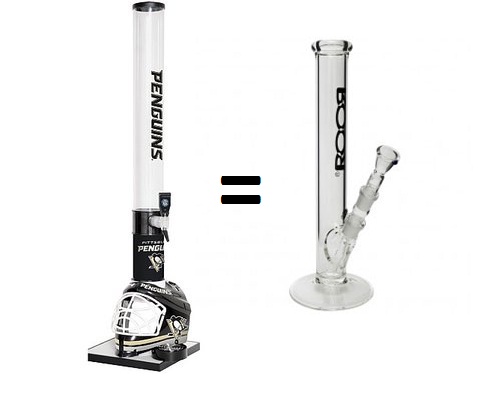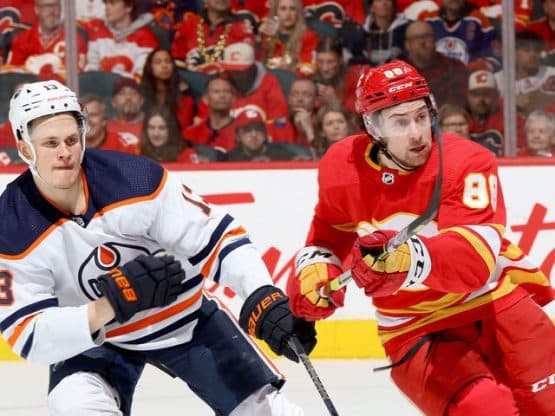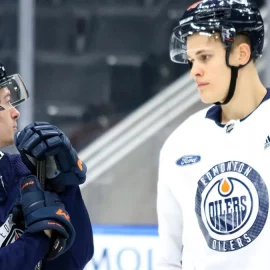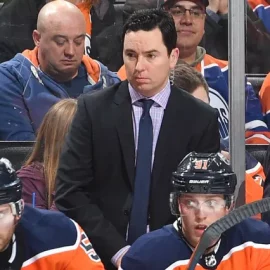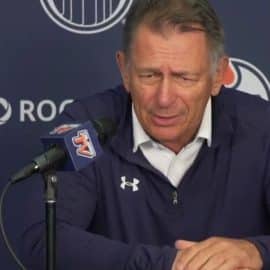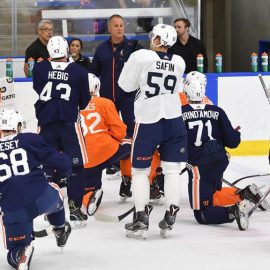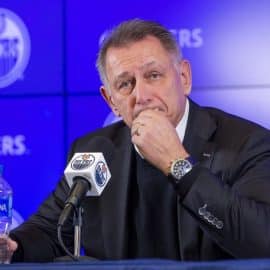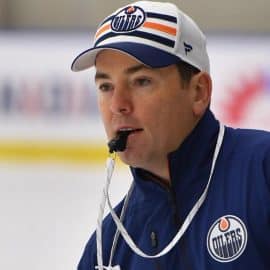[youtube http://www.youtube.com/watch?v=mAg8OxlAw8Q&w=420&h=315]
A number of days ago, Lowetide opened up an interesting can of worms.
“Looking back, I really wonder about Belov and Grebeshkov. I know you won’t believe me, but their numbers have a story to tell and one wonders if there was an opportunity missed there. Shows to go, that when you have so many moving parts it’s very easy to lose some good things in your life along the way.”
I’ll set aside the question of Belov for the moment (as far as missed opportunities go, he presents a much more clear cut case), as I want to focus on the fate of Denis Grebeshkov’s 2013-14 Oilers’ season.
Grebeshkov played only 7 games as an Oiler in 2013-14 (and only 39 AHL games with the Barons). In those 7 games, he had a single assist (in the AHL his boxcars looked like this: 2-7-9).
The universal sentiment appears to be that Grebeshkov was, in GM Craig MacTavish’s own words, “a failed experiment.” I’d like to re-visit the decision and offer a limited defense of the player, if not the decision to sign him.
Signing Grebeshkov to a one-year, one-way deal to the healthy tune of a 1.5 million dollar cap hit, showed MacTavish both trying to game the market inefficiencies of the hockey free agent market (i.e., by taking a flyer on once productive NHL player who was at the time, well off the radar) and failing to properly assess those same inefficiencies. As MacTavish recently noted, every year NHL UFAs command big money. And yet, he was also mindful that every year a few valuable, productive players fall through the cracks of the 30 team free agent sieve.
“Who are the Grabovskis of this year,” MacTavish asked, “that Washington picked up last year. They paid less for a guy like Grabovski and added a good element to their team. Those are some of the guys we’re going to be trying to find as this period and process goes on.”
Last year, two really good NHL defensemen struggled to get their heads above water to catch the lifeguard’s attention: Ron Hainsey (signed a 1 year, 2 million dollar deal with Carolina) and Tom Gilbert (signed a 1 year, 900K deal with Florida). Both signed late in the free agent season. Both signed short, cheap deals. Both would have been indefinitely better gambles than signing Denis Grebeshkov.
But, the man was signed. Let’s abandon the counterfactual of alternatives and take a look at the counterfactual of his actual season with the Oilers.
Grebeshkov’s Year as an Oiler (Twice Removed)
It didn’t start pretty, that’s for sure. After the initial fanfare of the signing, Grebeshkov showed up to training camp in sub-optimal shape (this couldn’t have impressed new head coach Dallas Eakins who was, at this point, full of fitness swagger, preaching like a middle-aged convert to some cause or another and making all manner of demands on those unrelated to his affairs). He promptly injured his groin in a pre-season game and was sent to the Barons on a conditioning stint.
By mid-October, however, he was back with the Oilers for his first actual NHL game play. He played a paltry 10 shifts for 6:55 of total ice time, in which he took a penalty. The Oilers won that game (3-1 against the Senators), but it was an awful effort and they were badly outshot. It was one of the rare occasions in the 2013-14 season where goaltender, the much maligned Devan Dubnyk, stole a game for the Oilers. Grebeshkov clearly didn’t enamor himself with his coach. He didn’t draw back into the line up for seven days, missing two games.
On the 26th, he played a largely unremarkable game in what was a total calamity of a day for the Oilers. They lost 5-4 to Phoenix, a game in which they found new and adventurous ways to lose both the lead and the win. For his own part, Grebeshkov lost a board battle in his own zone to Shane Doan, which led to the second Phoenix goal. The game, however, lies at the collective feet of the Oilers. A disaster.
His next game, marked another low-point in the Oilers’ season. On the 29th, the Oilers lost 4-0 to the Maple Leafs. This was a classic Leafs victory––badly, viciously outshot, they managed to “out finish” the Oilers as Eakins put it. At this point, Eakins was livid with his “D-zone coverage” and the turnover “gifts” the Oilers were offering up. Re-viewing the goals, however, it is hard to fault Grebeshkov for any of them. For 3 of them, he’s not on the ice. The third goal, which he was on the ice for, is an absolute beauty from the chubby, little genius Phil Kessel. It’s clear from watching the goal, however, that Kessel was not Grebeshkov’s man (it is Sam Gagner that is caught wandering on the goal, always hoping the puck will pop loose to him and gift him an offensive opportunity).
The next day the Oilers put Grebeshkov on waivers, he was not picked up and reported to the Barons.
When finally called back up to the NHL, a month later, on November 28th, Eakins summed up the situation thus far, saying:
“I don’t think (Grebeshkov) was in very good shape when he came in then he got hurt and really fell back. He just needed to go play, get some minutes, get his feet under him. Get his fitness level up to a higher standard. The good thing about Denis is he can break out the puck. He can make a play. That’s where we’ve been suffering a little bit in our own zone.”
So, the story thus far on Grebeshkov is a series of bad first impressions: he arrives out of shape to meet a fitness obsessed new boss; he gets injured; he plays satisfactorily, but in 3 of the most traumatizing games of the Oilers’ season; he gets waived.
Already, we can see that regardless of the player’s abilities (and Grebeshkov is undoubtedly an imperfect player), the situation was ripe for a fall guy, a guy to absorb a lot more perceived blame than reality warrants. So far, Grebeshkov’s situation hasn’t yet reached full scapegoat bloom. There’s just a hint of it.
Indeed, watching his Autumnal stay in Oklahoma City, Jonathan Willis noted that Grebeshkov really was out of hockey sorts and needed time to re-tool his game. Lowetide reviewed the situation up to that point and found room on his plate for optimism.
And, he played pretty well. For the next two games (the 28th vs. Nashville and the 29th vs. Columbus), Grebeshkov got a lot of ice-time (18:39 and 17:05 respectively), played well, and even picked up an assist.
And then… The Shift that Ruined Grebeshkov’s Hopes of Staying in the NHL
[youtube http://www.youtube.com/watch?v=4zXySjUlJ0k&w=560&h=315]
On the powerplay, Grebeshkov gets abandoned by his teammates, who’ve long since jumped the zone, and makes a weak play into enemy traffic and closes himself off against the boards. He’s stripped of the puck and gets out-raced to the net. Goal. Short-handed.
Even though four other Oilers didn’t bother to give him a safe outlet, or a modicum of defensive-zone support, the visual of the tape clouds the others in a haze. The puck-handler always shines in bright relief on moments like this. And, our memory reliably remembers who had the puck when it was lost and who made The Big Mistake. Only the archivist remembers the rest.
[Incidentally, fellow Russian blue-liner,Anton Belov’s NHL future arguably fizzled on the back of one particularly ugly big mistake on New Year’s Eve.]
Grebeshkov would play one more game in the NHL, get waived again and finish the year playing infrequently with the Barons down the stretch. All in all, a lousy season of hockey.
An Alternative View
While the sample size is extremely small (just 7 games, 2 of which he played less than 8 minutes of total ice-time), I believe there is a case to be made that Grebeshkov was a better NHL option than the common wisdom suggests.
If we look at his advanced stats for his brief NHL stay, we see that the puck was moving the right way when he was on the ice.
This is from extraskater.com. It shows that when Grebeshkov was on the ice, the share of total shot attempts (corsi) was in the Oilers’ favor (52.3%). It also shows that Grebeshkov, relative to his teammates’ efforts, outpaced the Oilers’ shot share by +3.5% (relative corsi).
If we look at the player usage chart (again, from extraskater) for all the Oilers’ D that played this year, we see that Grebeshkov (again, limited sample size) was the only one to manage a positive corsi score.
These underlying numbers, alongside his fairly strong play (in both the AHL and the NHL) just prior to that fateful shift against Dallas, suggest that Grebeshkov may well have had more to give this season.
He didn’t get an opportunity. So, we can’t know if he’d have kept up his modest showing, improved on it, or tanked completely.
It’s a small item in the laundry list of calamities that was the Oilers’ 2013-14 season. One of those calamities, as outlined above, was offering Grebeshkov a contract in the first place and not taking a run at Hainsey or Gilbert. But, the Oilers had a great deal of trouble breaking out of their own zone this past year. Eakins touched on this recently, saying:
“For us, especially on our back end, I thought our biggest problem last year was breaking the puck out. That led to us spending a lot of time in our own zone.”
Part of the problem, in my opinion, rested on the decision to play Nick Schultz and later Mark Fraser (often both) ahead of more agile, puck-moving defensemen like Belov, Grebeshkov and Fedun.
I believe a reasonable case can be made, given the number of games played by seriously flawed defensemen this year for the Oilers, that Grebeshkov deserved a longer NHL look.
[adsanity id=1808 align=alignnone /]Add The Sports Daily to your Google News Feed!
